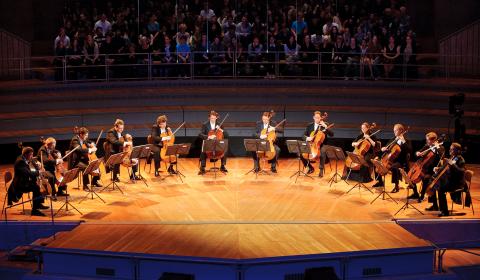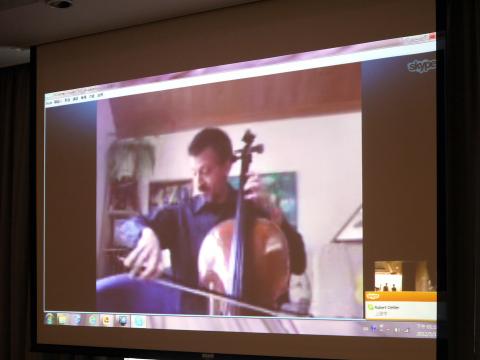Every orchestra may well have 12 cellos, but attempting to “clone” the 12 Cellists of the Berlin Philharmonic — the world’s foremost cello ensemble, aka “The 12 Cellists” — is a formidable ask. Thanks to the efforts of renowned Taiwanese cellist Chang Chen-chieh, who has maintained a friendship with the 12 cellists for many years, Chang managed to grab two of the ensemble’s 30 concerts, as part of its 40th anniversary season, to present several works that have become meaningful to the ensemble over the past four decades. These two performances will be on July 4 in Kaohsiung and July 5 in Taipei.
One of the most important works of the 12 Cellists is Hymnus for 12 Cellos, Op. 57, written by German cello professor Julius Klengel (1859-1933) for his 12 cello students in 1920, for without this historic piece, the 12 Cellists might not even exist. At a press conference in Taipei last Tuesday, Berlin Philharmonic principal cellist Ludwig Quandt said from his home in Berlin via an online video conference that Austrian Broadcasting found the score of Hymnus and invited the Berlin Philharmonic members to play the unusual piece, until then all but forgotten, in 1972. The 12 Cellists’ first concert was a success and astonished then Berlin Philharmonic director Herbert von Karajan in the audience, praising its beautiful tonal combination as the sound of nature. Thus, the cellists decided to stay together as an independent group. The 12 Cellists will, of course, play Hymnus as the opening piece in the concerts in Taiwan.
Though the individual members of the 12 cellists have changed since then, the standard of the group’s performance today is better than ever, said Chang. According to Quandt, the most senior cellist in the ensemble today has been a member of the Berlin Philharmonic since 1986. The ensemble’s repertoire ranges from original compositions to arrangements, including jazz, tango and avant-garde music. Through years of practice, the 12 cellists, each of whom contributes a vital part of a musical whole, demonstrate their well-coordinated musical rapport and well-attuned intoxicating timbres on 48 strings, covering the tonal range of the human voice.

Photo courtesy of Pro-Art Camerata
照片由弦外之音團提供
The all-cello ensemble, sitting in a large semi-circle, takes audiences by storm whenever it plays. In its upcoming Taiwan tour, in addition to Hymnus, it will play a program of works, including Villa-Lobos’ Bachianas Brasilieras No. 1, Piazzolla’s Adios Nonino, Libertango, and Fuga y misterio, The Beatles’ All my Loving, arranged by Shigeaki Saegusa, Morricone’s The Man with the Harmonica, Duke Ellington’s Caravan, and other crossover works.
Chang, who has been called the king of innovation, may bring a surprise to audiences in The 12 Cellists concerts by playing as the13th cellist in an encore piece. But Chang said last Tuesday that he has not decided yet since he might be too busy organizing the concerts to appear as the 13th cellist. In the concerts in Taiwan two years ago, the 12 Cellists performed Taiwanese folk classics Du-Du-Dang and Jasmine in June as their encore pieces, and Chang hopes that this year, the ensemble will perform another Taiwanese folk classic Dark, Dark is the Sky. This, however, will depend on whether pianist and composer Hsieh Wan-ling, Chang’s wife, has time to arrange the song for the 12 cellists.
(Lin Ya-ti, Taipei Times)
每個樂團都可能有十二把大提琴,但是像「柏林愛樂十二把大提琴」(簡稱「十二把大提琴」)這樣頂尖的重奏組合,幾乎是無從複製。台灣知名大提琴家張正傑因與當今十二位柏林愛樂大提琴家擁有多年好交情,所以台灣觀眾託他的福,在日、韓、中國、香港等地爭相邀約之下,台灣「搶」到兩場「十二把大提琴」成軍四十年訪台音樂會─七月四日在高雄與五日在台北─為台灣樂迷獻上樂團這四十年來多首精選名曲。

Photo: Lin Ya-ti, Taipei Times
照片:台北時報林亞蒂
說到「十二把大提琴」,就不得不提德國大提琴教授朱利斯‧克林格(一八五九-一九三三)於一九二○年為其十二位大提琴學生所譜寫的《讚美詩》,因為沒有這首歷史性的曲子,就不會有「十二把大提琴」的存在。柏林愛樂大提琴首席路德維希‧鄺特上週二從柏林家中透過網路視訊表示,奧地利國家廣播電台發現克林格遺留下來的《讚美詩》,並於一九七二年請當時柏林愛樂的十二位大提琴家,錄製這首被遺忘且編制特殊的曲目。其第一場音樂會深受好評,更是讓當時在觀眾席聆賞的柏林愛樂總監赫伯特‧馮‧卡拉揚讚譽為天籟,因而成就了這個特殊的重奏組合。「十二把大提琴」也將在台灣的兩場音樂會上,演奏《讚美詩》作為音樂會的開場。
張正傑上週二表示,雖然當今十二位大提琴家有別於創團時的十二位,但現在正值「十二把大提琴」演奏水準最佳的時期。鄺特表示,目前最資深的大提琴團員,早在一九八六年即加入柏林愛樂。此重奏團的曲目從原創到改編都有,類型涵蓋爵士、探戈,甚至是前衛音樂。「十二把大提琴」經年累月培養出十足的默契,每位大提琴家都扮演著不可或缺的角色,讓一共有四十八條弦的十二把大提琴,在人聲涵蓋的所有音域上,合作無間地奏出令人如痴如醉的音色。
凡演奏必造成轟動的半圓形排列清一色大提琴組合,除了《讚美詩》外,亦將為台灣觀眾獻上維拉─羅伯斯的《第一號巴赫風格的巴西》、皮亞佐拉的《再會了!諾尼諾》、《自由探戈》與《神秘的賦格》、由三枝成彰改編披頭四樂團的《我所有的愛》、莫利克奈的《口琴浪人》,艾靈頓公爵的《篷車隊》等跨界曲目。
有創意點子王的張正傑,這回或許也會帶來驚喜,成為第十三把大提琴家!不過他上週二表示,身為主辦單位,他可能會忙到無法以第十三把大提琴之姿獻藝。「十二把大提琴」兩年前訪台的安可曲演出台灣名謠《丟丟銅仔》與《六月茉莉》,而張正傑表示,希望這次樂團能帶來《天黑黑》,不過還得有人將此曲改編給十二把大提琴才行,就看張正傑的夫人鋼琴家兼作曲家謝婉玲,是否願意提筆譜曲。
(台北時報記者林亞蒂)

Oxford University Press (OUP) will no longer publish a controversial academic journal sponsored by China’s Ministry of Justice after years of concerns that several papers in the publication did not meet ethical standards about DNA collection. A statement published on the Web site of Forensic Sciences Research (FSR) states that OUP will stop publishing the quarterly journal after this year. FSR is a journal that comes from China’s Academy of Forensic Science, an agency that sits under the Ministry of Justice. The academy describes FSR as “the only English quarterly journal in the field of forensic science in China that focuses on

A recent medical malpractice case involving a physician trained abroad has once again placed BoBo Doctors under public scrutiny. This incident has revived concerns about the quality of healthcare in Taiwan and highlighted ongoing debates regarding the legitimacy and impact of these doctors in the medical field. The term “BoBo Doctors” refers to Taiwanese students who fail to gain entry into domestic medical programs and instead pursue medical degrees in countries like Poland and other Eastern European nations. Not until they return to Taiwan do they attempt to qualify as practicing doctors by relying on their foreign qualifications to

A: A number of high-profile films are being released this summer movie season. B: I just went to see Superman and visited the Superman-themed DC pop-up store. A: F1, Jurassic World: Rebirth and The Fantastic Four: First Steps are also popular. B: Adapted from a fantasy novel, South Korean blockbuster Omniscient Reader Viewpoint — starring Lee Min-ho, Paul Ahn and Blackpink member Jisoo — is also highly anticipated. A: Let’s not forget that the Taiwanese film Gatao – Big Brothers, the newest of the Gatao series, is set to open next month. A: 今年暑期檔強片真不少! B: 我最近才剛看了《超人》,還去了超人主題「DC快閃店」。 A: 《F1》、《侏羅紀世界:重生》、《驚奇4超人:第一步》……等巨片也都大受歡迎。 B:

Continued from yesterday(延續自昨日) https://www.taipeitimes.com/News/lang According to supporters, a four-day workweek is an effective way for companies to attract and keep employees. Productivity can even be improved by achieving the same output in fewer hours. The primary workforce of the future, adults between the ages of 18 and 34, are strong supporters of this pattern. More than three-quarters of them believe a four-day workweek will become common practice in five years, while 65 person say they reject a return to full-time office work. This group considers mental health and general well-being as their top priorities, and it seems certain that they will be